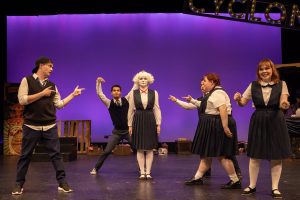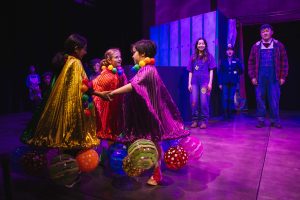Download a PDF of this release
Media Contacts:
ArtsFund: Katy Corella, katycorella@artsfund.org
Paul G. Allen Family Foundation: press@pgafamilyfoundation.org
FOR IMMEDIATE RELEASE
$10 million awarded to 811 Washington state arts and culture organizations through the Community Accelerator Grant program
Following a successful $10M pilot in 2023, the second year of the program sees 93% of pilot grantees reapplying and nearly 30% increase in total grantees.
SEATTLE – May 21, 2024 – Today, ArtsFund and the Paul G. Allen Family Foundation announce $10M in funding to 811 grantees through the second year of the Community Accelerator Grant program. This builds on the program’s 2023 pilot investment in Washington’s arts and culture sector that provided $10M in funding to 671 organizations.
Administered by ArtsFund and funded by the Paul G. Allen Family Foundation, the new round of grants range from $2,500 to $25,000 in response to ongoing needs of arts and culture organizations. The unrestricted $10M in funding will boost organizations’ abilities to invest in their missions and essential roles serving communities across the state.
“ArtsFund is grateful for the second year of partnership with the Paul G. Allen Family Foundation on the Community Accelerator Grant,” said Michael Greer, president and CEO of ArtsFund. “Our ability to distribute $10M of unrestricted funding to such a wide and representative group of nonprofit arts and cultural organizations throughout 37 counties in Washington will add resources to groups whose work creates a better quality of life for communities across the state.”
Grants were awarded to every eligible nonprofit organization that applied. Approximately 70 percent of grantees reported annual budgets of less than $500,000 and average awards were $12,330. This year’s distribution includes organizations in 37 counties throughout Washington, representing 99.8% of the state’s population. The top five disciplines represented in the grantee pool include music, cultural heritage, multidisciplinary, theatre, and visual arts.
“From the Olympics to the Palouse, every corner of our state is brimming with diverse and rich cultural activity, and we are incredibly heartened by the extensive reach and continued impact of this program,” said Lara Littlefield, executive director of partnerships and programs for the Paul G. Allen Family Foundation. “We are proud to partner again with ArtsFund and the Community Advisory Panel, who have continued to administer this novel, community-driven model that distributes capital quickly, equitably, and efficiently to these organizations that are so essential for building our vibrant and healthy communities.”
The Community Accelerator Grant prioritizes resources to communities who are underrepresented in other funding programs – specifically, those in rural communities, and for BIPOC, LGBTQ+, and people with disabilities. The application was designed to be low-barrier, with the goal that no organization would find it too complicated, or the information requested too cumbersome. We believe that the ease and efficiency during application and distribution of this community-driven model is one of the major reasons that 93% of grantees from the pilot reapplied for this second year of funding.
Applicants were asked to what degree they felt this grant might positively impact their ability to build capacity and increase their sustainability: Organizations anticipate raising an additional $3.60 for every $1 of their grant, resulting in a potential program impact of $36 million. This year, the program saw an increase in priority communities on staff and boards as representation continues to be an important consideration. Half of the total grantee pool has more than 25% of staff identifying as BIPOC. The program also distributed funds to 10 out of 29 (34%) of Washington’s federally recognized tribes.
See the complete list of grant recipients HERE.
Community Advisory Panel
A Community Advisory Panel consisting of 16 panelists from around Washington and the U.S. provided recommendations on the application design, outreach, evaluation, and outcome.
“It has been inspiring to see how the Community Accelerator Grant has reached communities that are often overlooked or challenged to find essential funds for general operations,” said Troy Coalman, Community Advisory Panelist and senior director of donor impact at Wellspring Family Services. “The Community Advisory Panel put a lot of energy into making the process of applying equitable, while still capturing the necessary information to make an informed decision. It is my sincere hope that other funding organizations, and the nonprofit sector as a whole, observe what has been achieved through the Community Accelerator Grant because it exemplifies a direction in philanthropy we should all be considering.”
Applications were considered based on representation and centering of priority communities, as well as geographic location and overall alignment with the goals of the program in conjunction with the recommendations of the Community Advisory Panel.
Grantees cite the top uses for the unrestricted funding, in order of priority, are programming; salaries and labor; rent, mortgage and facility upgrades; and communications and marketing, with 85% of organizations citing programming, or salaries and labor, as their top needs.
The initiative follows several years of pandemic impacts on the arts and culture sector including drops in revenue, challenges with reopening logistics, audience hesitation to return to pre-pandemic levels of cultural participation, and workforce impacts. This second $10 million investment also responds directly to the sector’s current challenges with increased organizational costs as well as revenue and ticket sales disruptions due to economic inflation.
###
About ArtsFund
ArtsFund supports the arts through leadership, advocacy, and grantmaking in order to build a healthy, equitable, and creative Washington. Founded in 1969, the Seattle-based nonprofit has been building community through the arts for more than 50 years. ArtsFund was originally founded to bring corporate and civic leaders together to help establish and sustain our region’s arts and cultural institutions. Over its grantmaking history, ArtsFund has supported more than 1,000 arts organizations with more than $115 million in grants, and provided valuable leadership and advocacy. Learn more at www.artsfund.org.
View the 2023 case studies
About Paul G. Allen Family Foundation
Founded in 1988 by philanthropists Jody Allen and the late Paul G. Allen, co-founder of Microsoft, the foundation invests in communities across the Pacific Northwest to enhance the human experience of arts & culture, center under-served populations, and mobilize young people to make impact. In addition, the foundation supports a global portfolio of nonprofit partners working across science and technology solutions to protect wildlife, preserve ocean health, and create lasting change. The foundation also funds the Paul G. Allen Frontiers Group, which works to advance cutting-edge research in all areas of bioscience. Learn more at www.pgafamilyfoundation.org.
Fast Facts
• A total of $10M has been awarded to 811 organizations
• 28% of groups were first time applicants to the program
• 93% of year 1 grantees applied to the program in year 2
• 100% of eligible applicants received a grant
• Grants range from $2,500 to $25,000 and are unrestricted (meaning they can be used for anything)
• The average grant size is $12,330
o Award averages were higher among groups who served the centered populations (BIPOC, LGBTQ+, individuals with disabilities), groups that are BIPOC led, and rural groups.
• All counties with average award size over $15,000 have a population density of less than 100 people per sq. mi.
• The program was informed by a Community Advisory Panel who advised ArtsFund on the application design, outreach, evaluation and outcome, and included 16 panelists who represent geographic and demographic diversity.
• Grantees anticipate a 3.6 : 1 revenue generation for every $1 of their grant, resulting in a potential program impact of $36 million.
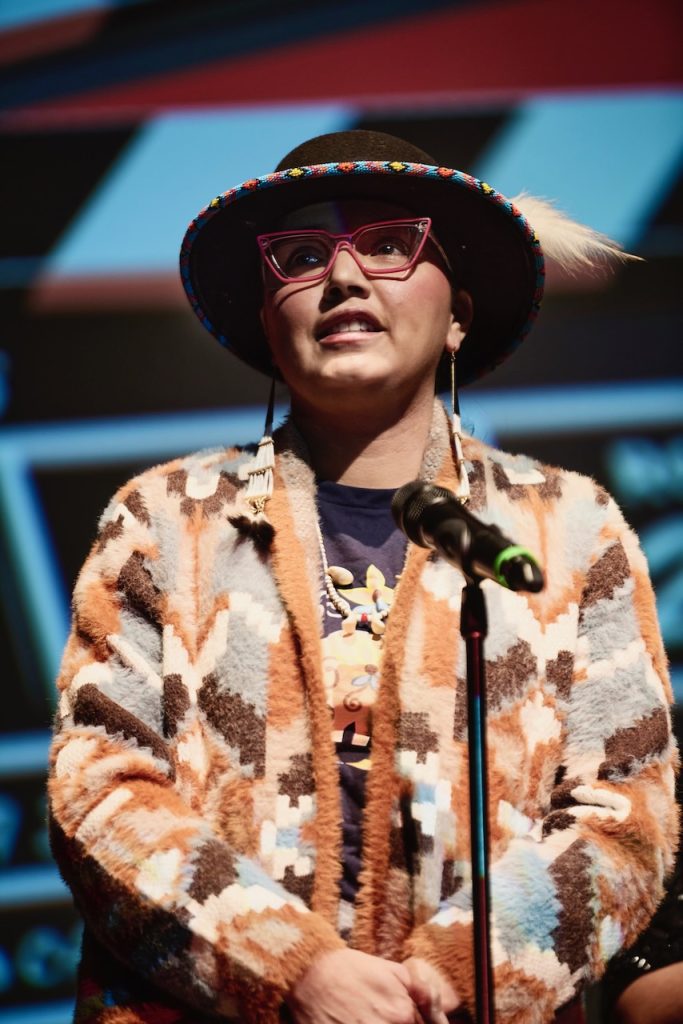
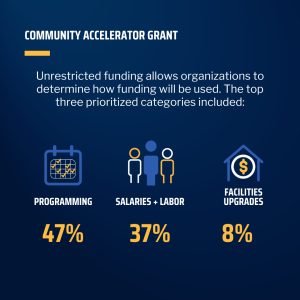
Grantees indicated they would use funds in the following areas:
• 47% on programming
• 37% on Salaries and Labor
• 8% on rents/mortgage/facility upgrades
This year, almost half the groups are planning on using these unrestricted funds to invest on programming, making it possible for grantees to continue delivering art and cultural experiences to Washingtonians across the state.
Representation of Centered Populations
The Community Accelerator Grant process was developed to support cultural organizations without equal access to mainstream funding, including, rural communities, and organizations serving BIPOC, LGBTQ+, and people with disabilities. In order to measure the degree to which organizations are serving those various communities, the application asked for geographic location, representation of centered populations on staff and Board, and programming focus.
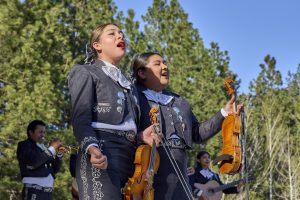
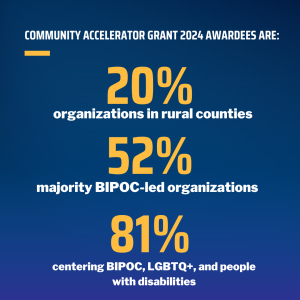
Organizations in 37 out of Washington’s 39 counties received funding, representing 99.8% of the state’s population, with 20% of grantees representing rural populations (as defined by Washington state). Over the two-year history of the grant, 38 of the 39 counties have received funding from the program.
81% of grantees create and/or provide programming centering one or more of the centered communities.
The following percentage of applicants responded with either “strongly agree” or “agree” to the prompt “Our organization creates and provides programming centering the following communities”:
• BIPOC: 72%
• LGBTQ+: 54%
• People with Disabilities: 45%
Between the pilot year and 2024, there were increases in representation of the centered communities (BIPOC, LGBTQ+, and people with disabilities) on staffs and boards among grantees. We found that 52% of grantees in 2024 are majority BIPOC led (50%+ on board and staff).
In 2024, 34% of Washington’s federally recognized tribes received funding.
Washington’s Arts and Cultural Organizations
• Approximately 70% of grantees reported their annual budget at less than $500K.
• 31% of those groups had a budget between $25,000 and $100,000, which is a 3% increase from year 1, meaning smaller groups are getting the funding.
• Of the 12 discipline options, the top five ranked include Music, Cultural Heritage, Multidisciplinary, Theatre, and Visual Arts.
• Organizations cite the top uses for funding, in order of priority, include programming; salaries and labor; programming; rent, mortgage and facility upgrades; communications and marketing; and personal protective equipment and COVID preparedness, with more approximately 85% of organizations citing programming and salaries and labor as their top needs.
• More than $70 billion in value was added to the Washington State economy through the arts in 2022, representing the highest percentage in the nation, at 9.52% of the State’s economy according to recently released data from the National Endowment for the Arts.
